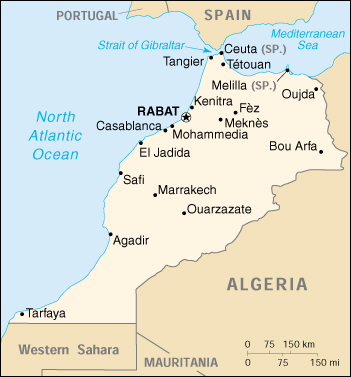

Status Quo Side: Algeria
Non-Status Quo Side: Morocco
Region: Africa
Conflict Type: Interstate
Issues in Dispute: Territory
Morocco is the core of a once-great Maghrib Empire. At independence in 1956, borders with Spain, Mauretania and Algeria remained uncertain. Irredentist pressures prompted Mohammed V to lay claim in February 1958 to vast Saharan regions including the Tindouf and Colomb-Bechar regions of Algeria.
Once independent in 1962, Algeria placed troops in Tindouf where pro-Morocco sentiment led to incidents across the border. Moroccan anti-Algerian feeling was fed by Algerian slighting of prior aid, Algiers' support of Egypt in pan-Arab affairs and the discovery of manganese in Colomb-Bechar. Mauretania's acceptance as an OAU founding member left Algeria the main target of Hassan II, who was coming under increasing domestic pressure to take a hard line. At Oujda on October 5 1963 the rival Foreign Ministers agreed to a heads of state meeting and a boundary commission.
Before either body met, Algerian troops captured two outposts, Morocco mobilized, and troops were committed in three areas. Algeria received Soviet and Egyptian aid. Mediation attempts by Ethiopia, Tunisia, the UNSYG and the Arab League failed. On an initiative by Mali, agreement was reached at Bamak on a November 2 cease-fire and an OAU Council of Ministers meeting.
An OAU-sponsored Committee obtained agreement to end the conflict, but the border issue remained unresolved.
On January 15 1969 the Presidents of Algeria and Morocco signed a 20-year treaty of cooperation. A joint commission agreed on the boundary on May 27 1970. The Tindouf would remain Algerian with joint exploitation of the area's iron ore resources.
The agreement was completed in June 1972 at an OAU summit in Rabat.